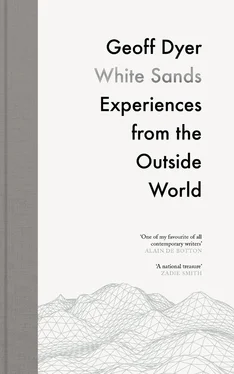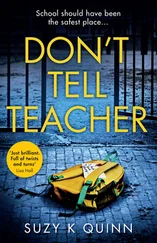Another helpful comparison is with the temples designed by David Best at Burning Man in Nevada. They’re similarly big but, unlike Rodia’s towers or Ozymandias’ monument, instead of being built to last they’re built in order to be burned at the end of each year’s week-long festival. And whereas Rodia’s towers were built single-handedly, Best’s are the work of hundreds of volunteers, all working together. But both towers and temples are community-based, providing a focus for a neighbourhood (in the case of Rodia) or a city (admittedly a temporary one in Best’s case).
So Rodia got on with it, went steadily about his work day after day, in spite of tiredness, periods of sickness and the never-to-be-underestimated urge to lie down on the sofa and do nothing. My uncle built his own house after working as a brick layer during the day — and said it nearly killed him (before he killed himself, many years later, in the garage of the completed house). Perhaps a cussedness was essential in enabling Rodia to stick at the task, in the way that some people are able to sustain grudges over several decades. He had something to do, and he did it until it was done. Even so, there must have been days when Rodia had to drag his aching legs to the towers and force his heavy arms to climb them, when it was only after working for several hours that the friction of dull drudgery gave way to the steady rhythm of ongoing accomplishment, that he no longer had to overcome the reluctance of his own body, did not have to force himself to keep going. Or perhaps, at some point, he was so habituated to working that it didn’t occur to him to do anything else. This was what he did to relax. Travailler, ça repose : the ideal of the artist’s life embodied by Rodin. Gathering materials, doggedly lugging things up the towers, day in, day out, not stopping.
For every Cheval or Rodia there must have been hundreds of eccentrics who conceived the idea of devoting their energies to doing ‘something big’ before running out of time, resources, energy or will. Some got bored, fed up. Having committed themselves to doing whatever it is that keeps them off the sauce, the lure of the bottle at the end of a day — or a week or a year — of thirsty work proves irresistible and, on reflection, adequately rewarding. It doesn’t even need to be ‘something big.’ The most modest ambitions go unfulfilled: a loft conversion, a planned extension to a house, fixing a wonky front door that doesn’t close properly. The knowledge that there are things to do, tasks to be completed, is enough to keep postponing them, to give life a sense of projected purpose and improvement. Having made the long-postponed decision to go into the office just three days a week so that he can have more time to devote to his frustrated urge to play the saxophone, a solicitor discovers, in the two extra days at his disposal, that the main purpose of the musical dream was to blind him to the truth of his existence and identity: that he is a solicitor through and through. (Maybe men like Rodia have to exist in a state of something like sustained desperation, to be devoid of other options, even the most common one of all: the support of a marriage, happy or otherwise. ‘Those with “something to fall back on” invariably fall back on it,’ writes David Mamet. ‘They intended to all along. That is why they provided themselves with it. But those with no alternative see the world differently.’) Or think of the person who believes he has a book in him, only to discover that the imagined book is destined to stay in him, that it will not be written, will never be completed, let alone published. Such disillusion or resignation is not the preserve of those who dream of writing a book. Writers are dogged constantly by the fear of not being able to do it anymore. The suspicion that each book might be their last is often what fuels their continuing productivity. Fear of future inability proves to be a powerful and immediate incentive. Along the way, however, they become conscious of the books they won’t or can’t write. At some point many writers will contemplate doing their own version of George Steiner’s My Unwritten Books —though for most it will take its place among their unwritten books. Under that title there are perhaps two categories of book: those that are unstarted and those that are unfinished.
For several years I have wanted to write a book called The Ballad of Jimmy Garrison . It would be about Coltrane’s bassist, the way he stayed with Trane after Elvin Jones and McCoy Tyner had left, after the classic quartet first expanded to a sextet (with Rashied Ali and Pharoah) and then shrank back to a quintet (with Alice Coltrane taking over from Tyner on piano). It would also, necessarily, be about Ornette Coleman (with whom Garrison and Elvin recorded Love Call and New York Is Now ), about the meeting of Coleman and Haden in L.A., and about Pharoah and Albert Ayler. I loved the title of this projected book even though I knew it was never going to be a book-length project, would at best be the title piece in a volume whose subtitle— And Other Essays —would be an admission of failure and abandonment; a failure which turned out to be more thorough-going even than that.
In 2013, Jessica and I spent four months in Williamsburg, Brooklyn. Whenever there was any excuse — a meeting on the East Side of Midtown Manhattan, an exhibition at PS1—I took the East River Ferry, one of those rare and wonderful services that combine sightseeing for tourists with functionality for commuters.
Albert Ayler’s body was found in the East River on 25 November 1970. When Don Cherry first met this man ‘with sparkling eyes and a happy smile’ in Copenhagen he felt himself to be in ‘the presence of someone that was carrying the gift and the voice and reflection of god.’ Ayler played at Coltrane’s funeral service on 21 July 1967 (as did Ornette and Haden). He believed that Coltrane was the Father, Pharoah the Son, and he himself the Holy Ghost. He ended up dead in the East River. There were rumours, conspiracies, but the accepted explanation is that it was suicide.
By jazz standards Ayler was not a prolific composer, but the best of his songs are amazing concentrations of jazz history: from New Orleans marching bands to music that pointed beyond what he called ‘the cosmic bebop’ of Coltrane. It’s easy to see — to hear — what Cherry meant when he said that Ayler’s best-known composition, ‘Ghosts,’ ‘should be our national anthem’ even if it’s an anthem that turns the idea of nationhood — and of anthems — inside out before tearing them to shreds and, eventually, bringing them back from the dead.
I listened to the ecstatic despair of ‘Ghosts,’ to ‘Universal Indians’ and ‘Omega’ on repeated trips on the East River Ferry, from Williamsburg to Thirty-fourth Street or down to the Brooklyn Bridge. The few notes I made amounted to nothing except the knowledge that it was too late, that I should have written about Ayler in 1989, that there would be no more to The Ballad of Jimmy Garrison than the title.
It is so difficult to know whether you are giving up on a book because it really is unwriteable or if you are just being lazy, if you have rationalised the idea of its being unwriteable because you lack the stamina to stick at it, to keep grinding it out. Even if you have been writing for a long time— especially if you have been writing for a long time — it is almost impossible to work through the layers of subterfuge, the self-deceptions and self-exonerations that lead you to abandon a book and to forgive yourself for having done so. Once you have made the decision to abandon ship, it requires a certain amount of will-power to persist with the abandonment, not to lapse back into sneaked looks at the manuscript, to learn to ignore the little glimmers of hope, not to gnaw away at it until the ‘it’ becomes that which has been abandoned, that which is still in the process of being abandoned and that which is in the exhausted process of being revived. At some point complete withdrawal is the only solution. After which, it is possible that some parts of what was abandoned and discarded can be used in an entirely different way, in the creation of something new.
Читать дальше












